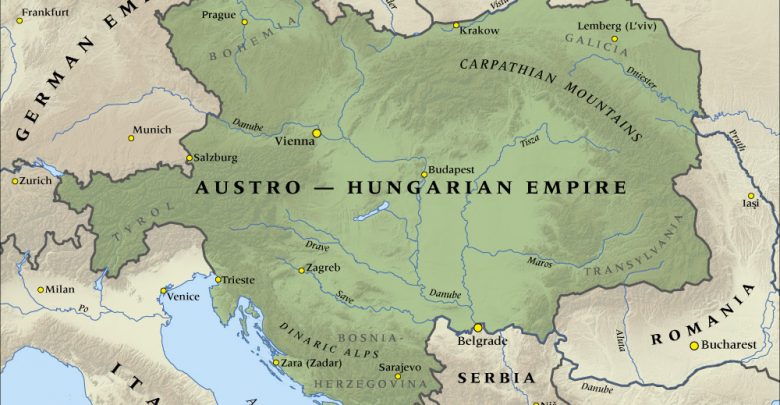On This Day in 1914: Franz Ferdinand’s assassination in Sarajevo

On this day in 1914, Archduke (and heir presumptive) Franz Ferdinand of Austria and his wife Sophie of Austria-Hungary are assassinated in Sarajevo; this assassination would soon escalate, causing the outbreak of the First World War.
Since it would be almost impossible and highly impractical to describe every event that increased tensions between the Great Powers, ultimately leading to war (such as the Bosnian Crisis, the Second Moroccan Crisis, the Balkan Wars, etc.), this post will instead focus on the assassination and the after effects.
Before we do that, however, it would be wise to understand what kind of departure Franz represented for the Habsburg monarchy. This stark difference stems, at least in part, from his support to an idea of reform of the Empire into the so-called United States of Greater Austria (Vereinigte Staaten von Groß-Österreich).
Federation under Franz Ferdinand – desperate gamble or sane suggestion?

Aurel C. Popovici can be considered a proto-precursor to such great European statesmen as Jean Monnet, Alcide De Gasperi, Robert Schuman, Konrad Adenauer, and Altiero Spinelli. As a lawyer of Romanian ethnicity, he was sensitive to the issue of coexistence within the borders of the Empire. He spoke of the difficulties faced by Austria-Hungary during the 19th and early 20th centuries, and proposed thusly:
“The great origin, language, customs and different mentality of different nationalities requires, for the whole Empire of the Habsburgs, a certain state form, which can guarantee that not a single nationality will be threatened, obstructed or offended in its national political life, in its private development, in its national pride, in one word – in its way of feeling and living”.
In other words, he spoke of transforming the Dual Monarchy into a federation of nation-states. In essence, Aurel C. Popovici’s plan stipulated the division of the empire’s territory into fifteen States, with the possibility that more could join in the future, modeling accession on the United States of America. Franz Ferdinand threw his weight behind this proposal.
The proposed member States were as follows:
1. German Austria – meaning the German interior Austria together with the whole German realm from the western Hungarian border, together with the German realm from the South-East of Bohemia and Southern Moravia.
2. German Bohemia – the North-West part of Bohemia together with Tratenau.
3. German Moravia – which would contain almost the whole of German-speaking Silesia, meaning the Schönhengst region.
4. Bohemia – the whole Czech realm of Bohemia, Moravia and the Czech-speaking parts of Silesia.
5. Western Galicia – the whole realm inhabited by the Poles within the Empire.
6. Eastern Galicia – the Ruthenian part of the country with the Ruthean counties from Hungary and Bukovina.
7. Transylvania with all the regions inhabited by Romanians from Hungary and Romania.
8. Croatia – with Dalmatia, the Croatian Istria, Fiume and Mur Island.
9. Ukraine – which would contain all the Slovak settlements.
10. Slovakia.
11. Vojvodina – a Serbian State located in then-Southern Hungary.
12. Hungary.
13. The Country of Székely – the Hungarian parts of the following three counties from Transylvania: Trei Scaune, Ciuc, Udvasarhely, with the adjacent Hungarian parts from Mures-Turda.
14. Tyrol.
15. Trieste – with the Italian Görz and the Italian Istria.
The attention paid by Aurel C. Popovici to the idea of dividing the Empire on the ethnic-national criteria is astounding.
The idea of the Dual Monarchy system of 1867 had been to split the previous Austrian Empire into two realms, one German-dominated, the other Hungarian-dominated. However, after various demonstrations, uprisings and acts of terrorism, it became readily apparent that the notion of two ethnic groups dominating the other ten could not survive in perpetuum.
Franz Ferdinand had planned to redraw the map of Austria-Hungary radically, creating a number of ethnically and linguistically dominated semi-autonomous “states” which would all be part of a larger confederation renamed the United States of Greater Austria. Under this plan, language and cultural identification was encouraged, and the disproportionate balance of power would be corrected.
However, the Archduke was assassinated at Sarajevo in 1914. After the war, Austria-Hungary was dismantled and several new nation-states were created, and various Austro-Hungarian territories were ceded to neighboring countries by the victorious Entente powers.

Serbia – duplicitous aggressor or innocent victim?
Back to the assassination. On June 28, 1914, the young Bosnian nationalist Gavrilo Princip shot and killed the Archduke and his wife as they drove through the Bosnian capital of Sarajevo. Princip was a member of a conspiracy hatched by a political terrorist society called “Union or Death” (“Уједињење или смрт/Ujedinjenje ili smrt”), better known as the Black Hand. The chief of intelligence of the Serbian army’s general staff had helped plan the crime. Even though his role was not actually known at the time, it was generally believed that Serbian officials were involved.
While it is still impossible to know whether the Serbian Government at large played a hand in the assassination, there’s no denying that Belgrade took advantage of the situation. When the Austrians wished to mount an investigation they were hampered by the Serbian authorities, who assisted in the escape of numerous guilty persons from Austrian fury, which they also claimed to have known nothing of. “We have no knowledge of anybody named Milan Ciganović” while giving money and passports to that very person to get away. On May 27, 1914, the escapee supplied Nedjelko Cabrinovic, Gavrilo Princip and Trifko Grabez with four revolvers, six bombs and vials of poison. There is also evidence to suggest that it was Ciganović who informed Nikola Pašić, the prime minister of Serbia, about the planned assassination.

It is untrue, as many allege, that Serbia accepted every point of the Austrian ultimatum, or that Austria had been planning on rejecting the ultimatum no matter the response. The Serbian reply was annotated by Berchtold, who pointed out that it yielded in substance while denying in form. He passed this to the Germans, on reception the Kaiser wrote in the margins “a fantastic performance.” Both the Austrians and the Germans were agreed that the Serbs were dodging, and they rejected the Serbian reply as unsatisfactory. Yet even then war was not doomed to happen: Russia had urged that Serbia accept Austrian demands, but was ignored.
The Serbs were assured of Russian support in any event, and were not shy of fighting. The kingdom was buoyed by recent success against the Ottoman Empire and against Bulgaria. Serbia had successfully defied and humiliated Austria during the after effects of the Balkan Wars when she had occupied Northern Albania. It took the active assistance of Italy and the ultimatum from the powers to remove the Serbs, who had ignored the Austrians alone. It was only when Serbia was made to realize that Russia would not support her, that she withdrew.

Desperate attempts to keep the peace
In July of 1914 this assistance was forthcoming. The Serbs knew that Russia would not abandon them this time because the Russians expressly said so. This Russian declaration encouraged them to defy Austria, who Serbian newspapers referred to as “worm-eaten.” As such, punishment of Serbia was recognized as necessary. Proposals by Lord Edward Grey to submit the question to international arbitration were rejected by Vienna, which had an unpleasant experience with the London Conference which resolved the earlier question about Albania, not entirely to Austrian satisfaction. Austria was determined to avoid a repetition of that, and with good reason as Austria suspected that Italy, the United Kingdom, France, and Russia, would be arranged against Germany alone who would be favorable to Austria. Germany’s voice would be drowned.
Grey recognised the validity of this and therefore proposed instead a solution similar to that proposed by the Germans: that Austria, who had by then declared war so as to prevent any conferences from stopping them from punishing Serbia, be allowed to occupy Belgrade, or some other portion of Serbian territory in order to display her resolve and restore her prestige in the Balkans, and then withdraw after having achieved Serbian acquiescence to the ultimatum. This was called the so called “Halt in Belgrade” proposal when made by Germany, and the “pledge plan” when revived and supported by Britain. The cardinal point was that Serbia would be restored to full sovereignty and full pre-war territorial extent, a point on which Russia insisted.

This point the Austrians would not grant. Franz Ferdinand’s murder was far from the limelight already at this point: Vienna intended to destroy Serbia. Count Berchtold in a rather sinister Machiavellian manner, declared that Austria had no intention of seizing Serbian territory. What he failed to omit is that while Austria didn’t want to annex Serbian territory, it nonetheless intended to grant Serbian territory to Albania and Bulgaria, then place the remainder in the position of a client state. So he was not technically lying, but his assurances were hollow and unconvincing, which the Germans were suspicious of as alluded to in an a telegram in which Bethmann-Hollweg privately confided to the German Ambassador in Vienna that he believed “that the Austrian Government is harbouring plans which it sees fit to conceal from us.”
Serbian agitation against Austria, among Austrian subjects, its loud clamoring that Austria was decrepit and weak, talking of making war upon Austria, its dubious conduct in regards to the investigation, its complicity in the murder of the Archduke Franz Ferdinand, and its refusal to grant Austria’s demands on account of being assured of Russian support justified Austria’s desire to remove this threat from her border. Austria did not fear Serbia, but feared fighting Serbia along with Russia. Austria gambled that she could eliminate Serbia as a danger without Russian intervention, which ironically brought about the very scenario it was trying to avoid.

A plan for peace rejected
That Austria intended to rid itself of this nuisance can hardly be condemned as any nation would have done the same, which was recognized in principle by all the powers (except Russia) when they subscribed to the pledge plan, which implied they regarded the occupation of a portion of Serbia by Austrian forces to be justified and within the rights of Austria. It was wrecked by the refusal of the Russians to accept, and most decisively by the unequivocal rejection of the Austrians themselves.
Austria’s refusal to agree to the proposal of a conference or the pledge plan must be seen as a failure on Austria’s part to accommodate the insterests of Russia. Russian exasperation led to secret mobilisation of the Russian forces, and this must be seen as the primary catalyst for widening the war. As Kaiser Wilhelm II said in a telegram to King George V on July 31; “I just received news from Chancellor (Bethmann) that official notification has reached him that this night Nicky (Czar Nicholas II of Russia) has ordered the mobilization of his whole army and fleet. He has not even awaited the results of the mediation I am working at and left me without any news.”
By that time the categorical rejection of the pledge plan that Germany was pressuring Austria to accept had not yet arrived. The French began mobilizing in the west as per the agreement of 1892 that as soon as France or Russia heard the other had mobilized (Russian general mobilization publicly declared on July 29), the other would follow suit. France therefore mobilized on the 30th. Germany began mobilizing on the 31st, joined by general Austrian mobilization (against Russia) on the same day.

The central position of Germany made it necessary to defeat France rapidly before the Russians could fully mobilize. Germany therefore made inquiries in Paris as to whether France would come to Russia’s aid. The French answered evasively. On August 1 Germany declared war on Russia after its demand that Russia cease mobilization within 12 hours was ignored. On August 3, after the 18 hour time limit given to the French to declare their position was met with an unsatisfactory response, Germany declared war on France. Russia took responsibility for this, as Lord Grey noted to Sir Francis Bertie, the British ambassador to France:
“The latest news was that Russia had ordered a complete mobilization of her fleet and army. This, it seemed to me, would precipitate a crisis, and would make it appear that German mobilization was being forced by Russia.”
As indeed it was. The German ambassador to Russia was instructed by Bethmann to inform the Czar that general mobilization would force Germany to do the same, and that for Germany mobilization meant war because Germany was on a time limit. The Czar realized this perfectly well. In a council of ministers who wished to declare general mobilization the Czar exclaimed, with great emotion; “Think of the responsibility which you are advising me to take! Think of the thousands and thousands of men who will be sent to their deaths!”
Before this decision was made, Bethmann tried to prevent it by informing his ambassador to warn the Russians. This was reinforced by the final “Willy-Nicky” telegram where the Kaiser expressed the same sentiment, telling Nicholas II; “If Russia mobilizes against Austria my rôle as mediator, which I accepted at your express prayers, will be endangered, if not ruined. The whole weight of the decision lies on your shoulders now, who have to bear the responsibility for peace or war.”
Despite being made well aware of this, the Czar declared general mobilization anyway, which he must have known would cause war as is evidenced by his statement about thousands of men dying.
France bears responsibility for the war between Germany and France, and for the German invasion of Belgium. If France had desired peace it would have stated so, and Germany would have been loosed against Russia. Instead the French played games, avoiding direct statements, which seem to prove that France intended to intervene against Germany.
As for Britain, many make the claim that Lord Grey could have prevented the war by declaring Britain’s support for France, which presumably would have deterred Germany. Instead it would likely have made France and Russia even more intransigent than they were, and encourage them to reject Germany’s proposals. It would, if anything, have made war more likely as France and Russia could hardly be expected to pass up the opportunity of all three of them being united against Germany, especially since the joining of Britain to France would remove Italy from the Central Powers. If Britain had stated its position clearly, France and Russia would be in the best position to achieve their goals than they ever had been, and probably were ever to be.
Likewise claims that Britain could have prevented war by declaring its neutrality are equally misguided. They would have encouraged Austria to make greater demands on Russia, as the loss of England would probably cause France to hesitate, and without French support Russia would not dare face the wrath of Germany. So that too, would tend to make war more likely.
Though each power shares responsibility for spreading the war, chiefly Russia, the actual responsibility for the Austro-Serb conflict lies with Serbia.
The death of Franz Ferdinand negated the creation of a multinational federal project at the heart of Europe – and began the chain of events that would lead to the immolation of millions of European lives, as well as European relevance on the international stage.





